人教版七年级下册英语总复习资料
人教版初中英语七年级下册知识点总结
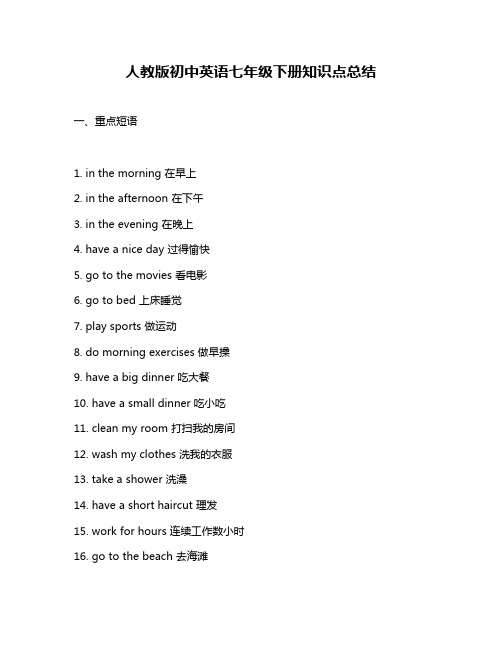
人教版初中英语七年级下册知识点总结一、重点短语1. in the morning 在早上2. in the afternoon 在下午3. in the evening 在晚上4. have a nice day 过得愉快5. go to the movies 看电影6. go to bed 上床睡觉7. play sports 做运动8. do morning exercises 做早操9. have a big dinner 吃大餐10. have a small dinner 吃小吃11. clean my room 打扫我的房间12. wash my clothes 洗我的衣服13. take a shower 洗澡14. have a short haircut 理发15. work for hours 连续工作数小时16. go to the beach 去海滩17. on the weekend 在周末18. listen to music 听音乐19. have a party 举办聚会20. watch TV 看电视21. play computer games 玩电脑游戏22. in the pool 在游泳池里23. go to the zoo 去动物园24. in the mountains 在山里25. have fun 玩得开心26. the great wall 长城27. many places of interest 名胜古迹28. be ready for 为……准备好29. stay healthy 保持健康30. how much 多少31. would you like 一些……吗?32. some noodles 一些面条33. order a pizza 定一个披萨饼34. make a phone order 电话订购35. would you like to do sth 你愿意做某事吗?36. want to do sth 想做某事37. would you like +名词你愿意要……吗?38. would you like +动词不定式你愿意……吗?39. choose some food 选择一些食物40. order the food 订购食物41. be careful 当心;小心42. not much 不多;少量的43. be ready to do sth 准备好做某事。
人教版初中英语七年级下册中考总复习:Units4-6七年级下册教材考点梳理整合+单元练习(含答案)
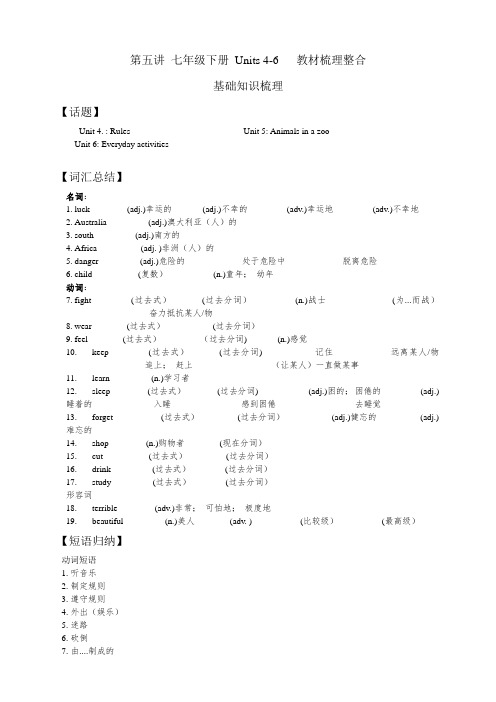
第五讲七年级下册Units 4-6 教材梳理整合基础知识梳理【话题】Unit 4. : Rules Unit 5: Animals in a zooUnit 6: Everyday activities【词汇总结】名词:1.luck ________(adj.)幸运的_______(adj.)不幸的_________(adv.)幸运地_________(adv.)不幸地2.Australia _________(adj.)澳大利亚(人)的3.south _________(adj.)南方的4.Africa _________ (adj. )非洲(人)的5.danger _________(adj.)危险的____________ 处于危险中_____________脱离危险6.child __________(复数)__________ (n.)童年;幼年动词:7.fight________ (过去式)_______(过去分词)__________(n.)战士_______________(为...而战)_________________ 奋力抵抗某人/物8.wear________(过去式)___________(过去分词)9.feel________(过去式)_________(过去分词)_______(n.)感觉10.keep ________(过去式)_______(过去分词)____________记住_____________远离某人/物_________________ 追上;赶上__________________(让某人)一直做某事11.learn _________(n.)学习者12.sleep ________(过去式)________(过去分词)___________ (adj.)困的;困倦的_________(adj.)睡着的______________入睡________________感到困倦__________________去睡觉13.forget __________ (过去式)_________(过去分词)___________(adj.)健忘的__________(adj.)难忘的14.shop ________(n.)购物者________(现在分词)15.cut __________(过去式)_________(过去分词)16.drink _________(过去式)________(过去分词)17.study _________(过去式)________(过去分词)形容词18.terrible ________(adv.)非常;可怕地;极度地19.beautiful _________(n.)美人________(adv. )___________(比较级)__________(最高级)【短语归纳】动词短语1.听音乐__________________2.制定规则__________________3.遵守规则___________________4.外出(娱乐)__________________5.迷路_________________________6.砍倒________________________7.由....制成的____________________8.看报纸____________________9.去电影院____________________10.出去吃饭____________________11.喝茶_______________________12.做汤______________________介词短语13.按时_______________________14.放学后____________________15.及时_____________________16.在食堂____________________17.处于(极大)危险之中______________________形容词短语18.(对某人)要求严格_____________19.害怕....______________________名词短语20.赛龙舟__________________21.端午节_____________________22.南非____________________【句子提炼】规则意识1.我们上课不能迟到。
人教版初中英语七年级下册中考总复习:Units1-3七年级下册教材考点梳理整合+单元练习(含答案)

第四讲七年级下册Units 1-3 教材梳理整合基础知识梳理【话题】Unit 1: joining a club Unit 2: Daily routinesUnit 3: Transportation【词汇总结】名词:1.story __________ (复数)2.brush _________(复数)3.tooth __________ (复数)______________ (刷牙)4.life ___________(复数)_____________拯救/丢掉某人的生命___________________ (过着....的生活)5.village __________ (n.)村民6.dish ________ (复数)___________ 洗碗________________主菜7.centre ___________ (adj.)中心的8.half ___________(复数)动词:9.sing ________(过去式)_________ (过去分词)_________(n.)歌手10.swim ________ (过去式)________(过去分词)________(n.)游泳者11.dance _________(n.)跳舞者12.draw __________(过去式)_________ (过去分词)13.tell __________(过去式)___________(过去分词)_________(现在分词)____________讲故事________________讲故事俱乐部14.write __________(过去式)_________ (过去分词)__________(n.)作家15.teach __________(过去式)_________(过去分词)__________ (n.)老师______________ 教某人做某事______________给某人一个教训16.run ___________(过去式)________(过去分词)__________ (现在分词)_________ (n.)跑步者17.clean __________ (n.)清洁工18.ride ___________(过去式)________ (过去分词)19.drive _________(过去式)___________ (过去分词)________(n. )司机_____________逼疯某人__________________驾照20.leave ___________(过去式)__________ (过去分词)___________ 把某物落在某地_______________留言21.bring_________(过去式)________(过去分词)__________使显现22.cross __________(prep.)__________(n.)十字路口23.relax _______(adj.)放松的_________(adj.)令人放松的24.like __________(反义词)______________看起来像_______________听起来像形容词:25.fun________(adj.) _________(比较级)____________(最高级)26.quick __________(adv.)27.true___________(n.) ___________(adv.)28.quiet ________(adv.)29.many ________(比较级)_________(最高级)30.good /well ________(比较级)_________(最高级)31.far _________(比较级)_________(最高级)【短语归纳】动词短语1.下国际象棋_____________________2.说英语_________________________3.弹吉他/钢琴____________________4.从事___________________________5.拉小提琴_______________________6.敲鼓___________________________7.交朋友________________________8.在某方面帮助某人_______________9.加入俱乐部_____________________10.起床___________________________11.穿上衣服_______________________12.吃早餐________________________13.洗淋浴__________________________14.去上学_________________________15.做作业__________________________16.上床睡觉________________________17.散步__________________________18.做运动_________________________19.乘地铁_________________________20.骑自行车_______________________21.步行去上学_____________________22.实现;变成现实_________________23.做早饭___________________________24.想起;认为______________________25.铺床_____________________________26.去上班_________________________27.思考;思索___________________介词短语28.在周末________________________29.在上学日的晚上_______________________30.骑自行车__________________________形容词短语31.擅长___________________________32.善于应付.....的;对...有办法___________________33.大量的;许多________________________34.对....有益/有好处___________________________【句子提炼】人物活动1, 你擅长讲故事,你可以加入讲故事俱乐部。
人教版七年级下册英语总复习
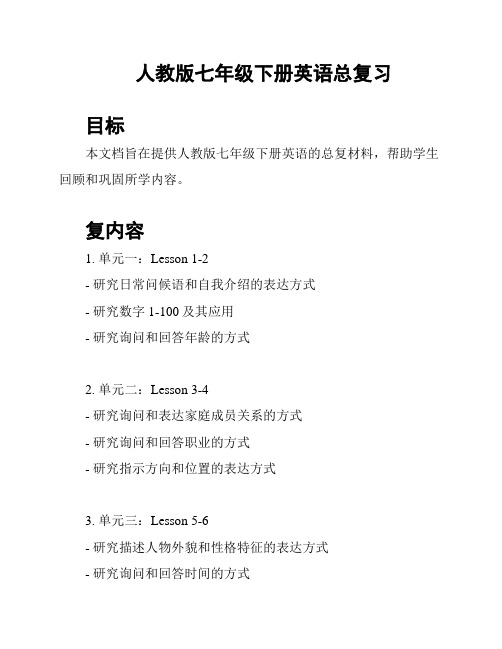
人教版七年级下册英语总复习
目标
本文档旨在提供人教版七年级下册英语的总复材料,帮助学生回顾和巩固所学内容。
复内容
1. 单元一:Lesson 1-2
- 研究日常问候语和自我介绍的表达方式
- 研究数字1-100及其应用
- 研究询问和回答年龄的方式
2. 单元二:Lesson 3-4
- 研究询问和表达家庭成员关系的方式
- 研究询问和回答职业的方式
- 研究指示方向和位置的表达方式
3. 单元三:Lesson 5-6
- 研究描述人物外貌和性格特征的表达方式
- 研究询问和回答时间的方式
- 研究表示频率的副词及其应用
4. 单元四:Lesson 7-8
- 研究描述人物喜好和日常活动的表达方式- 研究询问和回答能力和兴趣的方式
- 研究表达原因和结果的连词及其应用
5. 单元五:Lesson 9-10
- 研究描述家庭、房间和城市的表达方式- 研究询问和表达地点的方式
- 研究表示数量和价格的词汇及其应用
6. 单元六:Lesson 11-12
- 研究询问和回答日程安排的方式
- 研究表达喜怒和感受的形容词及其应用- 研究询问和表达能力和意愿的方式
复建议
- 复每个单元的重点词汇和常用句型
- 做相关单元的练题和听力练
- 跟读课文,注意语音和语调的准确性
- 制作复笔记,总结重点内容和常见问题- 参加口语练和模拟对话
祝愿同学们复习顺利,考试取得好成绩!。
人教版七年级英语下册总复习知识点考点总结归纳
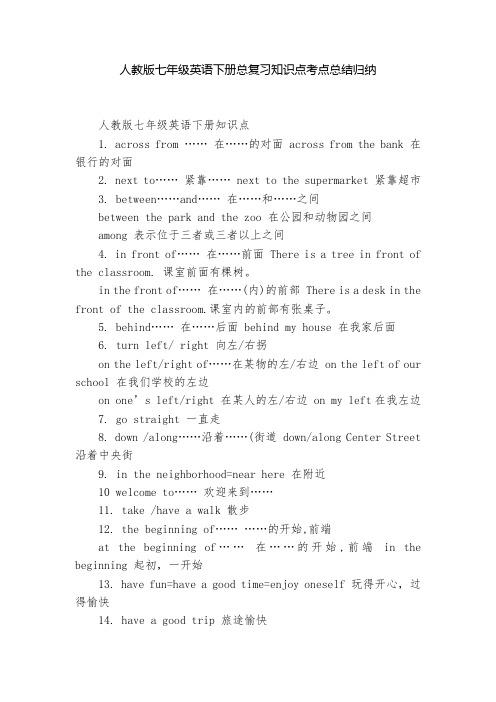
人教版七年级英语下册总复习知识点考点总结归纳人教版七年级英语下册知识点1. across from ……在……的对面 across from the bank 在银行的对面2. next to……紧靠…… next to the supermarket 紧靠超市3. between……and……在……和……之间between the park and the zoo 在公园和动物园之间among 表示位于三者或三者以上之间4. in front of……在……前面 There is a tree in front of the classroom. 课室前面有棵树。
in the front of……在……(内)的前部 There is a desk in the front of the classroom.课室内的前部有张桌子。
5. behind……在……后面 behind my house 在我家后面6. turn left/ right 向左/右拐on the left/right of……在某物的左/右边 on the left of our school 在我们学校的左边on one’s left/right 在某人的左/右边 on my left在我左边7. go straight 一直走8. down /along……沿着……(街道 down/along Center Street 沿着中央街9. in the neighborhood=near here 在附近10 welcome to……欢迎来到……11. take /have a walk 散步12. the beginning of…………的开始,前端at the beginning of……在……的开始,前端in the beginning 起初,一开始13. have fun=have a good time=enjoy oneself 玩得开心,过得愉快14. have a good trip 旅途愉快15. take a taxi 坐出租车16. 到达:get to +地方get here/ there/ home 到这/那/家 arrive in +大地方 I arrive in Beijing. arrive at +小地方I arrive at the bank. reach +地方17.go across 从物体表面横过 go across the street横过马路go through 从空间穿过 go through the forest穿过树林18.on + 街道的名称。
人教版人教版七年级下册英语知识点复习(完整版)
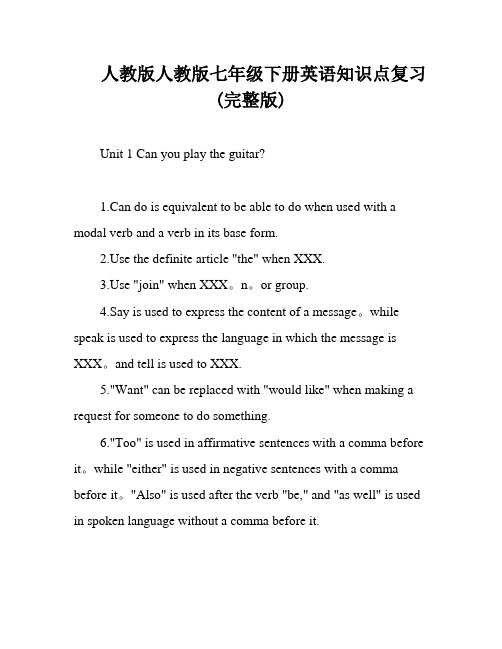
人教版人教版七年级下册英语知识点复习(完整版)Unit 1 Can you play the guitar?1.Can do is equivalent to be able to do when used with a modal verb and a verb in its base form.e the definite article "the" when XXX.e "join" when XXX。
n。
or group.4.Say is used to express the content of a message。
while speak is used to express the language in which the message is XXX。
and tell is used to XXX.5."Want" can be replaced with "would like" when making a request for someone to do something.6."Too" is used in affirmative sentences with a comma before it。
while "either" is used in negative sentences with a comma before it。
"Also" is used after the verb "be," and "as well" is used in spoken language without a comma before it.7."Be good at" is used to XXX or activity。
七年级下册英语复习知识点归纳全册人教版

七年级下册英语复习知识点归纳全册人教版Unit 1 - My School- Vocabulary: school subjects, classroom objects, school facilities - Grammar: present simple tense, imperative sentencesUnit 2 - I Love History- Vocabulary: historical events, famous people, time expressions - Grammar: past simple tense, wh-questionsUnit 3 - At a Music Lesson- Vocabulary: musical instruments, musical terms, types of music - Grammar: present continuous tense, adverbs of frequencyUnit 4 - Our Neighborhood- Vocabulary: places in the neighborhood, directions, prepositions of place- Grammar: there is/are, prepositions of locationUnit 5 - Rules and Regulations- Vocabulary: school rules, traffic rules, safety rules- Grammar: should/shouldn't, must/mustn't, imperativesUnit 6 - Jobs- Vocabulary: different professions, job responsibilities, workplace - Grammar: be going to, future plans and predictionsUnit 7 - Food and Nutrition- Vocabulary: types of food, eating habits, health and nutrition- Grammar: present continuous for future, going to for future plansUnit 8 - Our Oldest Friends- Vocabulary: animals, animal characteristics, habitatsUnit 9 - Sports Day- Grammar: past continuous tense, time expressionsUnit 10 - Our Environment- Vocabulary: environmental issues, pollution, conservation - Grammar: present perfect tense, adverbs of frequencyUnit 11 - Shopping Fun- Vocabulary: clothing, accessories, shopping expressions - Grammar: countable and uncountable nouns, some/anyUnit 12 - Festivals and Celebrations- Vocabulary: festivals and celebrations, traditions, customs- Grammar: present perfect vs past simple, question tagsUnit 13 - Travel Time- Vocabulary: modes of transportation, travel destinations, vacation activities- Grammar: will, won't, going to for future plansUnit 14 - Let's Go Camping- Vocabulary: camping equipment, nature, outdoor activities- Grammar: could/may/might, polite requestsUnit 15 - Music and Movies- Vocabulary: music genres, film genres, entertainment- Grammar: so/such, too/enough以上是七年级下册英语复习的知识点全册归纳。
人教版七年级下册英语知识点复习(完整版)

人教版七年级下册英语知识点复习(完整版) Unit 1 Can you play the guitar?1,情态动词+V原can do= be able to do2,Play+ the+ 乐器+球类,棋类3,join 参加社团、组织、团体4,4个说的区别:say+内容Speak+语言Talk 谈论talk about sth talk with sb talk to sbTell 告诉,讲述tell sb (not)to do sthTell stories/ jokes5,want= would like +(sb)to do sth6,4个也的区别:too 肯定句末(前面加逗号)Either否定句末(前面加逗号)Also 行前be 后As well 口语中(前面不加逗号)7,be good at+ V-ing=do well in 擅长于be good for 对…有益(be bad for对…有害)be good to 对…友好(good 可用friendly,nice,kind替换)be good with和…相处好=get on/ along well with8,特殊疑问句的构成:疑问词+一般疑问句9,How/ what about+V-ing …怎么样?(表建议)10,感官动词(look, sound, taste, smell, feel)+adj/ like11,选择疑问句:回答不能直接用Yes或者No,要从中选择一个回答12,students wanted for school show(wanted表示招募,含有被动意义)13,show sth to sb=show sb sth give sth to sb=give sb sth14,help sb (to)do sthHelp sb with sthWith sb’s help= with the help of sbHelp oneself to 随便享用15,be busy doing sth/ be busy with sth16,need to do sth17,be free= have time18,have friends= make friends19,call sb at +电话号码20,on the weekend= on weekends21,English-speaking students 说英语的学生(带有连词符,有形容词性质)22,do kung fu表演功夫Unit 2 What time do you go to school?1,问时间用what time或者whenAt+钟点at 7 o’clock at noon/ at night(during/ in the day)On+ 具体某天、星期、特指的一天on April 1st on Sunday on a cold winter morningIn +年、月、上午、下午、晚上2,时间读法:顺读法逆读法:分钟≤30用past five past eight(8:05)half past eight(8:30)分钟>30用to a quarter to ten(9:45)整点用…o’clock 7 o’clock(7:00)3,3个穿的区别:wear 表状态,接服装、手套、眼镜、香水等Put on 表动作,接服装Dress 表动作,接sb/ oneself get dressed穿衣3,感叹句:How+adj+主谓!How+adj+a/an +n单+主谓!What+ a/an +adj+ n单+主谓!What+ adj+ n复/ 不可数+主谓!4,from…to…5,be/ arrive late for6,频度副词(行前be 后)Always usually often sometimes seldom hardly never7,一段时间前面要用介词for for half an hour for five minutes8,eat/ have…for breakfast/ lunch/ dinner/ supper9,either…or10,a lot of=lots of11,it is +adj+for sb +to do sth (adj修饰to do sth)It is important for me to learn English.it is +adj+of sb +to do sth (adj修饰sb)It is kind/ friendly/ nice of you to help me.Unit 3 How do you get to school?1,疑问词How 如何(方式)how long 多长(时间)答语常用“(For/ about +)时间段”how far多远(距离)答语常用“(It’s +)数词 +miles/ meters/ kilometers”how often多久一次(频率)答语常用“Always/ often/ every day/…”或“次数+时间”等表频率的状语How soon多快,多久以后,常用在将来时中。
人教版七年级英语下册期末复习资料全册
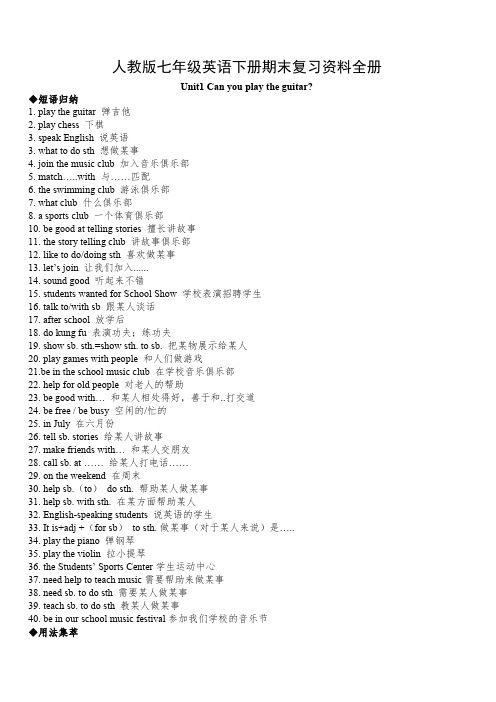
人教版七年级英语下册期末复习资料全册Unit1 Can you play the guitar?◆短语归纳1. play the guitar 弹吉他2. play chess 下棋3. speak English 说英语3. what to do sth 想做某事4. join the music club 加入音乐俱乐部5. match…..with 与……匹配6. the swimming club 游泳俱乐部7. what club 什么俱乐部8. a sports club 一个体育俱乐部10. be good at telling stories 擅长讲故事11. the story telling club 讲故事俱乐部12. like to do/doing sth 喜欢做某事13. let’s join 让我们加入......14. sound good 听起来不错15. students wanted for School Show 学校表演招聘学生16. talk to/with sb 跟某人谈话17. after school 放学后18. do kung fu 表演功夫;练功夫19. show sb. sth.=show sth. to sb. 把某物展示给某人20. play games with people 和人们做游戏21.be in the school music club 在学校音乐俱乐部22. help for old people 对老人的帮助23. be good with… 和某人相处得好,善于和..打交道24. be free / be busy 空闲的/忙的25. in July 在六月份26. tell sb. stories 给某人讲故事27. make friends with… 和某人交朋友28. call sb. at …… 给某人打电话……29. on the weekend 在周末30. help sb.(to)do sth. 帮助某人做某事31. help sb. with sth. 在某方面帮助某人32. English-speaking students 说英语的学生33. It is+adj +(for sb)to sth. 做某事(对于某人来说)是…..34. play the piano 弹钢琴35. play the violin 拉小提琴36. the Students’ Sports Center学生运动中心37. need help to teach music 需要帮助来做某事38. need sb. to do sth 需要某人做某事39. teach sb. to do sth 教某人做某事40. be in our school music festival 参加我们学校的音乐节◆用法集萃1. play +棋类/球类下…棋/打…球2. play the +西洋乐器弹/拉…乐器3. be good at doing sth.= do well in doing sth. 擅长做某事4. be good with sb. 和某人相处地好5. need sb. to do sth. 需要某人做某事6. can + 动词原形能/会做某事7. a little + 不可数名词一点儿…8. join the…club 加入…俱乐部9. like to do sth. =love to do sth. 喜欢/喜爱做某事◆典句必背1. —Can you draw? 你会画画吗?—Yes, I can./No, I can’t. 是的,我会。
人教版七年级英语下册知识点
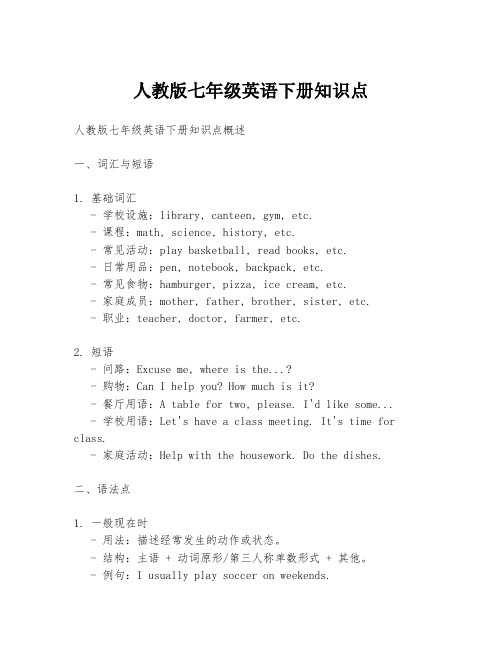
人教版七年级英语下册知识点人教版七年级英语下册知识点概述一、词汇与短语1. 基础词汇- 学校设施:library, canteen, gym, etc.- 课程:math, science, history, etc.- 常见活动:play basketball, read books, etc.- 日常用品:pen, notebook, backpack, etc.- 常见食物:hamburger, pizza, ice cream, etc.- 家庭成员:mother, father, brother, sister, etc.- 职业:teacher, doctor, farmer, etc.2. 短语- 问路:Excuse me, where is the...?- 购物:Can I help you? How much is it?- 餐厅用语:A table for two, please. I'd like some... - 学校用语:Let's have a class meeting. It's time for class.- 家庭活动:Help with the housework. Do the dishes.二、语法点1. 一般现在时- 用法:描述经常发生的动作或状态。
- 结构:主语 + 动词原形/第三人称单数形式 + 其他。
- 例句:I usually play soccer on weekends.2. 一般过去时- 用法:描述过去某一时间发生的动作或状态。
- 结构:主语 + 动词的过去式 + 其他。
- 例句:He visited his grandparents last week.3. 现在进行时- 用法:描述正在进行的动作。
- 结构:主语 + am/is/are + 动词-ing + 其他。
- 例句:She is reading a book now.4. 可数名词与不可数名词- 可数名词:可以用数字计数的名词,如:book, apple。
人教版七年级下册英语期末复习知识点总结汇编
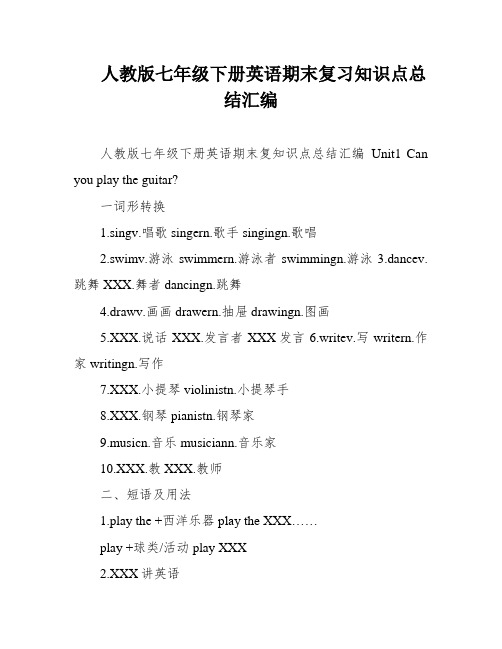
人教版七年级下册英语期末复习知识点总结汇编人教版七年级下册英语期末复知识点总结汇编Unit1 Can you play the guitar?一词形转换1.singv.唱歌singern.歌手singingn.歌唱2.swimv.游泳swimmern.游泳者swimmingn.游泳3.dancev.跳舞XXX.舞者dancingn.跳舞4.drawv.画画drawern.抽屉drawingn.图画5.XXX.说话XXX.发言者XXX发言6.writev.写writern.作家writingn.写作7.XXX.小提琴violinistn.小提琴手8.XXX.钢琴pianistn.钢琴家9.musicn.音乐musiciann.音乐家10.XXX.教XXX.教师二、短语及用法1.play the +西洋乐器play the XXX……play +球类/活动play XXX2.XXX讲英语XXX讲故事talk to/ with sb.和某人交谈 3.be good at + doing XXX擅长做某事=do well in (doing )sthbe good for对……有好处反义:be bad for对……有坏处be good to sb.对……友好= be friendly tobe good with善于应付……的4.make XXX和某人交朋友5.stay at home待在家6.help sb。
with sth/ help sb。
(to )do XXX帮助某人做某事7.on the weekend = on weekends在周末XXX教某人做某事XXX什么俱乐部music XXX XXX10.want to do XXX想要做某事want sb。
to do XXX想要或人做某事11.like to do sth/ doing XXX喜爱做某事12.be free/busy有空/忙碌的13.call sb。
七年级下册英语知识点总结归纳人教版
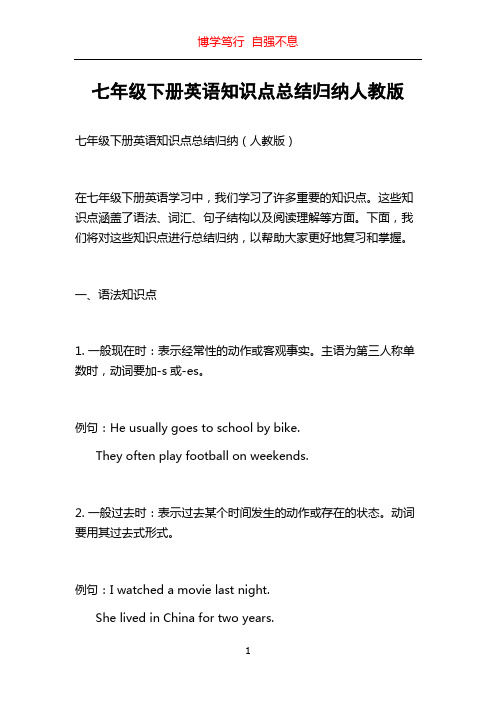
七年级下册英语知识点总结归纳人教版七年级下册英语知识点总结归纳(人教版)在七年级下册英语学习中,我们学习了许多重要的知识点。
这些知识点涵盖了语法、词汇、句子结构以及阅读理解等方面。
下面,我们将对这些知识点进行总结归纳,以帮助大家更好地复习和掌握。
一、语法知识点1. 一般现在时:表示经常性的动作或客观事实。
主语为第三人称单数时,动词要加-s或-es。
例句:He usually goes to school by bike.They often play football on weekends.2. 一般过去时:表示过去某个时间发生的动作或存在的状态。
动词要用其过去式形式。
例句:I watched a movie last night.She lived in China for two years.3. 现在进行时:表示说话时正在进行的动作。
构成:主语+be动词(am, is, are)+动词-ing。
例句:They are playing basketball in the park.We are learning English now.4. 一般将来时:表示将来要发生的动作或存在的状态。
构成:主语+will+动词原形。
例句:I will visit my grandparents next weekend.She will be a doctor in the future.5. 情态动词:can, may, must等,表示能力、许可、必须等。
例句:You can go to the park with us.Students must wear school uniforms.6. 宾语从句:用来充当主句中动词的宾语的从句。
例句:I think that he is a good student.She knows where the nearest supermarket is.二、词汇知识点1. 动词短语:由动词与副词/介词组成的短语。
人教版七年级英语下学期期末总复习重点知识汇总-(共64张PPT)
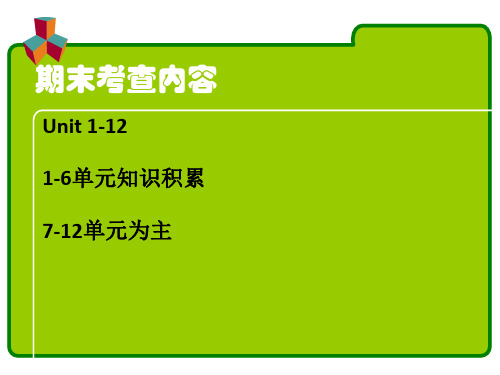
…To do/doing 两种用法பைடு நூலகம்
• find/see/ sb. do sth. → 观看/看见某人做某事 I saw you pick an apple just now. • find/see/sb. doing sth. → 观看/看见某人正在做某事 I saw you playing basketball with your classmates o
非谓语动词
• help sb. to do sth. →帮助某人做某事 Lucy often helps Lily to wash her clothes.
• help sb. do sth. →帮助某人做某事 He usually helps me learn English.
• help sb. with sth. →帮助某人做某事 I sometimes help my mother with the housework.
• take sb. to sp→带某人到某地 Mr. Wang took us to the Summer Palace last Sunday.
可跟双宾语的动词
• show sb. Sth→给某人看某物 Please show me the map. show sth. to sb. →把某物给某人看 Please show the map to me.
• buy sb. sth. →为某人买某物 Mother bought me a bike.
• buy sth. for sb. →为某人买某物 Mother bought a bike for me.
• give sb. sth →把某物给某人 Jim gave me an English dictionary.
人教版七年级下册英语复习资料

人教版七年级下册英语复习资料Unit 1 Where’s your pen pal from?一.短语:1. be from = come from 来自于……2. live in 居住在……14 years old 14岁favorite subject 最喜欢的科目3. on weekends 在周末4. write to sb = write a letter to sb给某人写信;写信给某人5. in the world 在世界上in China 在中国6. pen pal 笔友7. the United States 美国the United Kingdom 英国New York 纽约France 法国8. speak English 讲英语like and dislike 爱憎9. go to the movies 去看电影play sports 做运动二.重点句式:1. Where’s your pen pal from? = Where does your pen pal from?2. Where does he live?3. What language(s) does he speak?4 I want a pen pal in China.5 I can speak English and a little French.6 Please write and tell me about yourself.7 Can you write to me soon?8 I like going to the movies with my friends and playing sports. 三.本单元的国家,人民、语言对应。
1 Canada---- Canadian---- English / French2 France------ French------French3 Japan------Japanese----Japanese4 Australia----Australian----- English5 the United States------ American---- English6 the United Kingdom---British----- EnglishUnit 2 Where’s the post office?一.Asking ways: (问路)1. Where is (the nearest) ……?(最近的)……在哪里?2. Can you tell me the way to ……?你能告诉我去……的路吗?3. How can I get to ……?我怎样到达……呢?4.Is there ……near here / in the neighborhood?附近有……吗?5. Which is the way to ……?哪条是去……的路?二.Showing the ways: (指路)1. Go straight down / along this street. 沿着这条街一直走。
人教七级下册英语总复习资料.docx

英语七年级下册(人教版)总复习资料一、一般疑问句是以be 动、助动词、情态动词开头,用yes 或 no 来回答的句子。
陈述句改为一般疑问句规则如下:Ⅰ .当句子中含有be 动词( is, am, are )时,把be 动词提到句首,主语是第一人称时要改为第二人称。
如:I am a boy.→ Are you a boy?我是一个男孩。
你是一个男孩吗?you are a teacher.→ Are you a teacher?你是一个老师。
你是一个老师吗?He is doing homework.→ Is he doing homework?他正在做家庭作业。
他正在做家庭作业吗?Ⅱ. 当句子中含有情态动词(如 can )时,把情态动词提到句首,主语是第一人称时要改为第二人称。
You can speak English.→ Can you speak English?你会讲英语。
你会讲英语吗?I can dance.→ Can you dance?我会跑舞。
你会跳舞吗?Ⅲ. 当句子中谓语动词是实义动词时,应在句子前加助动词 do 或 does,如果是过去时态,则应当加did。
疑问句中谓语动词一律用动词原形。
You speak Chinese.→ Do you speak Chinese?你讲中文。
你讲中文吗?He likes English.→ Does he like English?他喜欢英语。
他喜欢英语吗?He went to the movies.→ Did he go to the movies?他去看了电影。
他去看了电影吗?二、特殊疑问句(特殊疑问词+一般疑问句语序)用特殊疑问代词Who、Whose、What、Which 或疑问副词 When、 Where、 Why、 How引导的疑问句。
1.What is your name?你叫什么名字?2.Who is he?他是谁?3.Whose pen is red?谁的钢笔是红色的?4.Which is your pen?哪支钢笔是你的?5.Where are you from?你来自哪里?6.When is your birthday?你什么时候生日?7.Why do you like koalas?你为什么喜欢树袋熊?8.How is the weather?天气怎么样?三、选择疑问句(一般疑问词+or +可选择部分)其回答是完整句子或其省略式。
初中英语人教版七年级下册复习资料

Unit 1 What’s the matter?一、本单元重点句型:1、What’s the matter(with you)? = What’s the trouble (with you)? = What’s wrong (with you)? =What happens/happened (to you)?你怎么了?其中you为宾格。
(me/ her/him/us/them)答语:I have a stomachache. 我胃痛。
have a cold 感冒have a (high)fever 发(高)烧have a cough/cough 咳嗽have a sore back背痛have a sore throat 喉咙痛have a toothache牙痛have a headache 头痛have a heart problem有心脏病have a nosebleed流鼻血have a serious accident遇到严重的意外have problems breathing 呼吸困难hurt oneself 受伤fall down 摔倒feel sick 感到恶心feel very hot 感到很热cut oneself 割伤某人自己cut his knee 割伤他的膝盖hurt his back 伤到了后背get hit on the head 头部挨打get hit by a ball 被球击中get sunburned 晒伤talk too much 说得太多2、----What should I do? 我该怎么办呢?----You should lie down and rest. 你应该躺下休息一会儿。
或You shouldn’t eat so much next time. 下次你不应该吃这么多。
drink enough water 喝足够的水drink hot tea with honey 喝加蜂蜜的热茶lie down and rest 躺下来休息take breaks/take a break 休息rest for a few days 休息几天get some rest 休息see a dentist 看牙医go to a doctor 看医生go to the hospital 去医院get an X-ray 拍X 光片take one’s(my/your/her/his/)temperature 量体温put some medicine on sth.在……上敷药put a bandage on sth.用绷带包扎bandage himself 给他自己包扎put her head down 把她的头下低run it under water 在水流下冲洗3、(1)、Should I put some medicine on it? 我应该在它上面敷些药吗?Yes, you should./ No, you shouldn’t. 是的,你应该。
(完整)新版人教版七年级英语下册期末总复习资料

新版人教版七年级英语下册总复习资料第一单元词组1. Play the guitar 弹吉他3. join the music club 加入俱乐部5. match -- with 与 ---- 匹配7. the swimming club 游泳俱乐部9. a sports club 一个体育俱乐部 11. the story telling club 讲故事俱 13. let ' s join 让我们加入 2. what to do sth 想做 某事 4. speak English 说英语 6. play chess 下棋 8. what club 什么俱乐部 10. be good at telling stories 擅长讲故事 12. like to do/doing 喜欢做某事 14. sounds good 听起来好 15. stude nts wan ted for School Shov 学校表演招聘学生 16. talk to /with 跟某人谈话 17. after school 放学后19. show sb sth=show sth to sbE 某物展示某人20. play games with people 和人们做游戏21. be in the school music club 学校音乐俱乐部 22. n eed sb to do sth 需要某人做某事27. help sb with sth 帮助某人做某事 28.English-speaking students 说英语的学生29. play the piano 弹钢琴 31. it +adj +for sb to sth 33. help for old people 对老人的帮助30. tell sth stories 给某人讲故事32. be good with 和某人相处好34. make friends with 和某人交朋友35. in July / on the morning of 36. be free / be busy37. the Students ' Sports cen 学生的运动中 38. teach sb to do sth 教某人做某事39. need help to teach music 需要帮助来做某事40. the teacher do what he can to help students 老师做他能做的事来帮助学生用法集萃play +棋类/球类 下 ..... 棋,打 ... 球 play the +西洋乐器 弹/拉 ... 乐器be good at doing sth.= do well in doing sth. 擅长做某事典句必背Can you draw? Yes, I can. / No, I can ' t.What club do you want to join? I want to join the chess club.You can join the English club. Sounds good.I can speak English and I can also play soccer. Please call Mrs. Miller at 555-3721.18. do kung fu 表演功夫23. have fun doing 做事情很有趣24. on the weekend 在周末 25. call sb at 给某人打电话 26. help+sb +v 帮助某人be good with sb. 善于与某人相处can + 动词原形 能 /会做某事 join the …cli 加入…俱乐部 爱做某事need sb. To do sth.需要某人做某事 a little + 不可数名词 一点儿 like to do sth. =love to do sth.第二单元词组35. have a healthy life 有一个健康的生活方 式 用法集萃at +具体时间点 在几点(几分)eat breakfast/lu nch/di nn er 吃早饭/午饭/ 晚饭thirty\half past + 基数词 ...... 点半fifteen\a quarter to + 基数词 差一刻 到 ... 点from …to •从 .... 到 .... need to do sth 需要做某事典句必背1. What time do you usually get up? I usually get up at six thirty.2. That 's a funny time for breakfast.3. When do students uasually eat dinner?They usually eat dinner at a quarter to seven in the evening.4. In the evening, I either watch TV or play computer games.5. At twelve,she eats lots of fruit and vegetables for lunch..6. She knows it 's not good for her, but it tastes good.7. Here are your clothes.1. go to school 去上学 3. get dressed 穿衣服 5. eat breakfast 吃早饭2. get up 起床4. brush teeth 刷牙6. take a shower 洗澡7. what time 什么时间9. an interesting job 一个有趣的工作11. always /usually/ often/ sometimes/ never13. from --- t o 从哪里到哪里15. a funny time 一个有趣的时间17. be late for 迟到19. on weekends 在周末21. half past six 六点半23. a quarter to seven 七点差一刻25. take a walk 散步27. half an hour 半个小时29. either --- or 或者 ---- 或者31. lots of /a lot of 许多33. taste good 尝起来好佳作赏析主题:谈论日常作息习惯My School DayI am a student. I usually get up at seven, and I eat breakfast at seven thirty. Then I goto school at eight. School starts at eight thirty. I eat lunch at taelve. I go home at 17:00. Ioften eat dinner at 19:00 and then play the piano. I do my homework at 20:00. At 22:00,I go to bed.第三单元词组1. get to school 到达学校3. take the subway 乘地铁 5. how do you get to school 怎么到达学校7. how far is it 多远 8. how long does it take sb todo sth 花费某人多长时间做某事9. ten minutes ------ how long 11. ride the bike to school 骑自行车到学校 13. walk to , drive to ,fly to 15. about= around 大约 17. good exercise 好的锻炼 19. get home 到达家 21. in his father 坐父亲的车10. ten minutes ' -w---a-l-k- h ow far12. every day 每天14. I ' m not sur 我不敢确信16. 10 kilometers away from 十公里远 18. walk to school 步行去学 20. drive his car to work 开车去上班 25. crossing the river is 穿过河是22. n eed about 10 mi nutes to get to schoo 需要十分钟的时间到达学校23. I want to know where Bob lives 我想知道鲍勃住到哪24. what do you think of =how do you like 你觉得怎么样26. it is easy to get to school=it ' s+ adj. +foi 到达学》校6很容易27. there is 就近原则 28. between -- and 在两者之间29. no= not any =not a 30. the river run quickly 河水流的快31.quickly 动作上 fast 速度上 soon 时间上 32. on a ropeway 在索道上33. go on a ropeway to cross the river 坐索道穿过河 37. love to do 喜欢做某事34. an 11-year-old boy — 个 11 岁大的男孩 35. ten minutes ' walk /- ma i nteunte walk 10 分钟的路 36. be afraid to do, be afraid of sth / doi ng 害怕做某事 38. be like a father to me 像父亲一样做某事40. leave sth at/ on /in +地点把某物留在某地44. thanks for +n /doing sth 为什么而感谢46. at about 8:00 在大约 8 点用法集萃take …to …=go to … 乘•““去…2. take the train 乘火车 4. ride a bike 骑自行车6. one hundred and five 105 39. leave for . 离开到某地41. come true 实现43. why ----- b ecause42. why not +v 原形45. how to do it 怎么来做它How do / does (sb) get to …?是怎样到…的?How far is it from …to从…?到…有多远?It takes sb. some time to do sth. 做某事花费某人多长时间。
- 1、下载文档前请自行甄别文档内容的完整性,平台不提供额外的编辑、内容补充、找答案等附加服务。
- 2、"仅部分预览"的文档,不可在线预览部分如存在完整性等问题,可反馈申请退款(可完整预览的文档不适用该条件!)。
- 3、如文档侵犯您的权益,请联系客服反馈,我们会尽快为您处理(人工客服工作时间:9:00-18:30)。
英语七年级下册(人教版)总复习资料一、一般疑问句是以be 动、助动词、情态动词开头,用yes 或no来回答的句子。
陈述句改为一般疑问句规则如下:Ⅰ. 当句子中含有be 动词(is, am, are)时,把be 动词提到句首,主语是第一人称时要改为第二人称。
如:I am a boy. →Are you a boy我是一个男孩。
你是一个男孩吗@you are a teacher. →Are you a teacher你是一个老师。
你是一个老师吗He is doing homework. →Is he doing homework他正在做家庭作业。
他正在做家庭作业吗Ⅱ. 当句子中含有情态动词(如can)时,把情态动词提到句首,主语是第一人称时要改为第二人称。
You can speak English. →Can you speak English你会讲英语。
你会讲英语吗I can dance. →Can you dance{我会跑舞。
你会跳舞吗Ⅲ. 当句子中谓语动词是实义动词时,应在句子前加助动词do或does,如果是过去时态,则应当加did 。
疑问句中谓语动词一律用动词原形。
You speak Chinese. →Do you speak Chinese你讲中文。
你讲中文吗He likes English. →Does he like English 他喜欢英语。
他喜欢英语吗He went to the movies. →Did he go to the movies他去看了电影。
他去看了电影吗#二、特殊疑问句(特殊疑问词+一般疑问句语序)用特殊疑问代词Who、Whose、What、Which或疑问副词When、Where、Why、How引导的疑问句。
1. What is your name 你叫什么名字2. Who is he 他是谁3. Whose pen is red 谁的钢笔是红色的4. Which is your pen 哪支钢笔是你的5. Where are you from 你来自哪里6. When is your birthday 你什么时候生日、7. Why do you like koalas 你为什么喜欢树袋熊8. How is the weather 天气怎么样三、选择疑问句(一般疑问词+or+可选择部分)其回答是完整句子或其省略式。
1. Do you like apples or pears 你喜欢苹果还是梨子I like apples. / Apples.我喜欢苹果。
/ 苹果。
2. Is it red or green 它是红色的还是绿色的It is red . / Red. 它是红色的。
/ 红色。
【Unit 1一、be from 来自于=come fromI am from China. = I come from China.我来自中国。
He is from China. = He comes from China.他来自中国。
My pen pal is from China. = My pen pal comes from China. 我的笔友来自中国。
1. 把上面三组句子改为否定句:①含有be 动词的,直接在be 动词后加not②含有实义动词的,要借助动词do 的否定形式构成否定句,即在实义动词前加don't。
如果是第三人称单数则加doesn't,如果是过去式加didn't,动词要还原。
以上三组句子的否定句为:I am not from China. = I don't come from China.He isn't from China. = He doesn't come from China. My pen pal isn't from China. = My pen pal doesn't come from China.我的笔友不是来自中国。
2. 以上三组句子的一般疑问句及其回答为:①把be动词提到句首,是第一人称的要改为第二人称。
|Are you from China Yes, I am. / No, I am not.Is he from China Yes, he is. / No, he isn't.Is you pen pal from China Yes, he (she) is ./ No, he (she) is.②含实义动词的,借助动词do完成,第三人称单数用does.Do you come from China Yes, I do. / No, I don't.Does he come from China Yes, he does. / No, he doesn't.Does your pen pal come from China Yes, he (she) does. / No, he (she) doesn't.3. 就以上三组陈述句画线部分(China)提问:即写出三组特殊疑问句(特殊疑问词+一般疑问句语序)China 为地名,所以特殊疑问词用“Where”Where are you from = Whre do you come from Where is he from = Where does he come from Where is your pen pal from = Where does your pen pal from 你的笔友来自哪里二、live 居住实义动词,表示居住在某地,其后面要加介词in.如:I live in China. 我住在中国。
He lives in China. 他住在中国。
My pen pal lives in China. 我的笔友住在中国。
:1. 以上三个句子的否定句为(实义动词要借助助动词do完成否定句和疑问句):I don't live in China .He doesn't live in China .My pen pal doesn't lives in China .2. 上面三个句子的一般疑问句及其答语为:Do you live in China Yes, I do. / No, I don't.Does he live in China Yes, he does./No, he doesn't. Does your pen pal live in China Yes, he (she) does. / No, he (she) doesn't.!3. 就画线部分(in China)提问,及其特殊疑问句(特殊疑问词+一般疑问句语序)。
因in China为地方,所以用“Where”提问Where do you liveWhere does he liveWhere does you pen pal live三、speak 讲,说实义动词,其后一般接某种语言I speak Chinese. 我讲中文。
He speaks Chinese. 他讲中文。
My pen pal speaks Chinese. 我的笔友讲中文。
~1. 其否定句为:I don't speak Chinese.He doesn't speak Chinese.My pen pal doesn't speak Chinese.2. 其一般疑问句及其答语为:Do you speak Chinese Yes, I do. / No, I don't.Does he speak Chinese Yes, he does. / No, he doesn't. Does your pen pal speak Chinese Yes, he (she) does. / No, he (she) doesn't.[3. 就画结部分(Chinese)提问因Chinese为语言,所以用“What language(什么语言)”来提问What language do you speakWhat language does he speakWhat language does your pen pal speakUnit 2一、“There be”句型“There is / are+某物/某人+某地/某时”表示“某地/某时有某物/某人。
”(某物/某人,单数用is,复数用are)。
如:There is a hotel on the street. 在街上有一个旅馆。
;其否定句为:There isn't a hotel on the street.其一般疑问句为:Is there a hotel on the street 其答语为:Yes , there is. / No, there isn't.其一般疑问句可用于问路二、表示方位的句子1. The hotel is on Center Street. (on,在……上面)旅馆在中心大街上。
2. The hotel is next to the post office. (next to,在……旁边)旅馆在邮局的旁边。
3. The hotel is in front of the post office.(in front of,在……前面)旅馆在邮局的前面。
…4. The hotel is behind the post office.(behind,在……后面)旅馆在邮局的后面。
5. The hotel is across from the post office.(across from,在……对面)旅馆在邮局的对面。
6. The hotel is between the post office and the library. (between ... and ... 在……与……之间)旅馆在邮局和图书馆之间。
就以上句子的画线部分提问:Where is the hotel 旅馆在哪里(问路的另一句型)三、指路用语go straight 直走go down / along 沿着……走'turn left / right 向左/右转go through 穿过the way to ... 去……的路pass 经过take a taxi 乘出租车arrive at / in 到达……Unit 3一、提出建议的句型之一Let's do sth. (Let's = Let us,do表示动词原形)让我们做某事。
